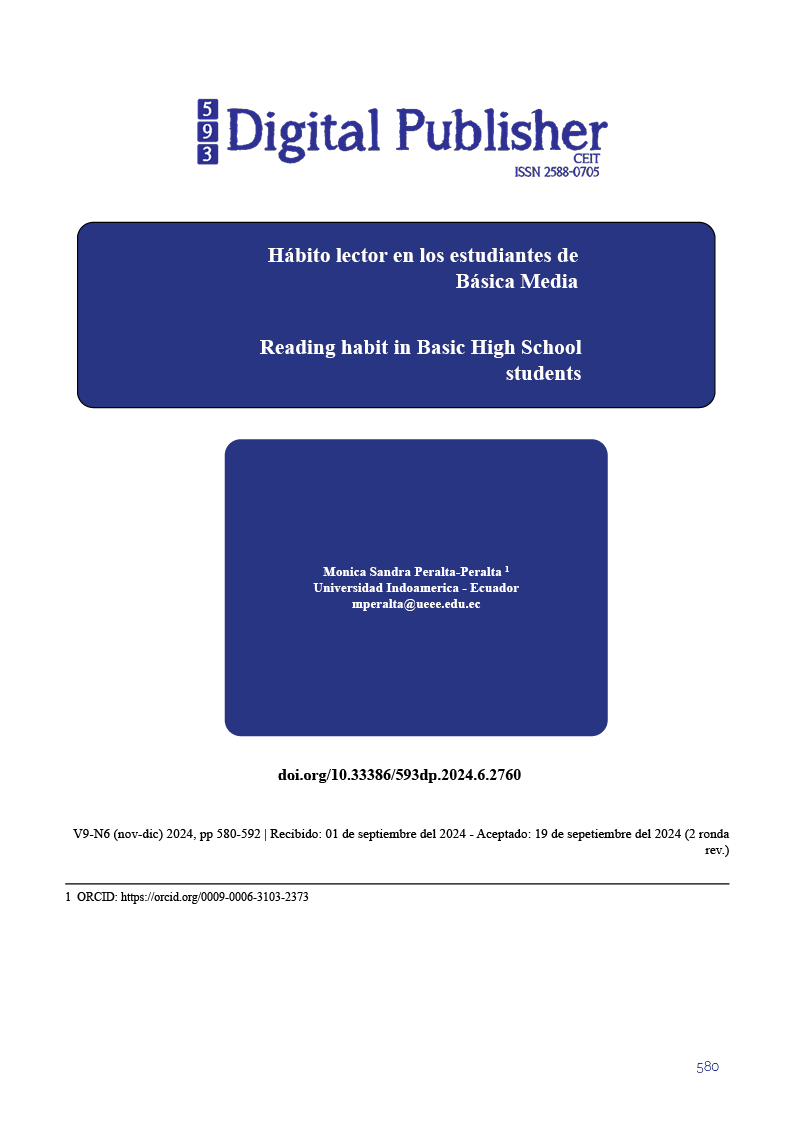Hábito lector en los estudiantes de Básica Media
Contenido principal del artículo
Resumen
El objetivo del presente trabajo fue determinar el hábito lector que poseen los estudiantes de Básica Media de la Unidad Educativa Esperanza Eterna, Provincia de Pastaza, parroquia Puyo, sector La Primavera, año lectivo 2023-2024. El enfoque metodológico se encuentra orientado hacia el desarrollo de una investigación de carácter cuantitativo, para ello, se utilizó el método inductivo-deductivo, utilizando la técnica de la encuesta y una escala de Likert con cuatro alternativas de respuesta a la población de estudiantes del quinto año de la institución, tomando como muestra a todos sus participantes de manera intencional. Los resultados obtenidos evidencian que la gran mayoría de encuestados “a veces” les gusta leer, mientras que el resto menciona que casi siempre y siempre. De esta forma se puede tener una idea de que, los estudiantes tienden a obtener un hábito lector, pero no desde la infancia, sin embargo, se debe brindar un acompañamiento para fortalecer esta actividad y la misma pueda formar parte de la cotidianidad. Por otra parte, es menester prestar especial atención a aquellos que no lo tienen para promoverlo. Dentro de las conclusiones se expresa que el hábito lector en su mayoría si lo tienen, solo debe fortalecerse incentivar a quienes no lo poseen para el desarrollo de su aprendizaje.
Descargas
Detalles del artículo

Esta obra está bajo una licencia internacional Creative Commons Atribución-NoComercial-CompartirIgual 4.0.
1. Derechos de autor
Las obras que se publican en 593 Digital Publisher CEIT están sujetas a los siguientes términos:
1.1. 593 Digital Publisher CEIT, conserva los derechos patrimoniales (copyright) de las obras publicadas, favorece y permite la reutilización de las mismas bajo la licencia Licencia Creative Commons 4.0 de Reconocimiento-NoComercial-CompartirIgual 4.0, por lo cual se pueden copiar, usar, difundir, transmitir y exponer públicamente, siempre que:
1.1.a. Se cite la autoría y fuente original de su publicación (revista, editorial, URL).
1.1.b. No se usen para fines comerciales u onerosos.
1.1.c. Se mencione la existencia y especificaciones de esta licencia de uso.
Citas
Bravo-Tuárez, M. E. B., Ramírez, G. G. G., Cedeño, Y. A. G., Jiménez, M. A. M., Sailema, H. F. C., & Vera, J. V. C. (2023). Lectoescritura y su influencia en el proceso de aprendizaje. Revista Científica Multidisciplinaria Ogma, 2(3), 34-45. https://revistaogma.com/index.php/home/article/view/27
Cabello, A. L. (2020). Las ideas filosóficas de Locke sobre educación. Phainomenon, 19(1), 73–84. https://doi.org/10.33539/phai.v19i1.2171
Cases Soler, I. (2017). El hábito lector en alumnos de Educación Primaria. Tesis. Universitat de les Illes Balears. Facultad de Educación. https://dspace.uib.es/xmlui/bitstream/handle/11201/3438/Cases_Soler_Ines.pdf
Chica-Rosales, M. J. C., Saltos, S. M. V., Palma, F. A. C., & Franco, A. N. A. (2022). La importancia de fomentar hábitos de lectura en estudiantes de segundo a séptimo grado para mejorar su comprensión lectora. Polo del Conocimiento: Revista científico-profesional, 7(8), 3327-3343. DOI: 10.23857/pc.v7i8
Locke, J. (1963). 1690 Ensayo sobre el Entendimiento Humano. https://reddeindra.wordpress.com/wp-content/uploads/2019/08/john-locke-ensayo-sobre-el-entendimiento-humano-fondo-de-cultura-econc3b3mica-2005-2.pdf
Loor Caicedo , M. M. ., & Cedeño Macías, L. M. . (2023). Estrategia educativa a través de rincones de lectura para fomentar el hábito lector en estudiantes de segundo año de educación general básica . Revista Científica Arbitrada Multidisciplinaria PENTACIENCIAS, 5(6), 762–773. https://doi.org/10.59169/pentaciencias.v5i6.890
Loor Cedeño, Z. J. (2023). Escape Room como estrategia para fortalecer la lectura en niños de Tercer Grado de EGB (Master's thesis, Universidad Nacional de Educación). http://201.159.222.12:8080/handle/56000/3269
Merga, M. K., & Roni, S. M. (2017). The influence of access to eReaders, computers and mobile phones on children's book reading frequency. Computers & Education, 109, 187-196. https://doi.org/10.1016/j.compedu.2017.02.016
Palmett, A. (2020). Métodos inductivo, deductivo y teoría de la pedagogía crítica. Petroglifos. Revista Crítica Transdisciplinar 3(1): 36-42 enero-junio 2020. SSN 2610-8186, 36-42. https://petroglifosrevistacritica.org.ve/wp-content/uploads/2020/08/D-03-01-05.pdf
Paucar, A. C., Llacsa Puma, L. J., & Meleán Romero, R. A. (2024). Hábito de lectura en estudiantes de Educación Primaria. Aula Virtual, 5(11), 29-43. https://doi.org/10.5281/zenodo.10464908
Ramos, J. (2021). Herramientas digitales para la educacion. Verlag GD Publishing Ltd. ISBN: 978 3 96931 413 5. https://books.google.co.ve/books/about/Herramientas_digitales_para_la_educaci%C3%B3.html?id=GmgjEAAAQBAJ&redir_esc=y
República del Ecuador. Instituto Nacional de Estadísticas y Censos. (2012). Hábitos de lectura en Ecuador. Quito: INEC. https://www.ecuadorencifras.gob.ec/wp-content/descargas/presentacion_habitos.pdf
Ríos González , G., & González Cárdenas , Y. (2020). “Estimular el uso del blog en los hábitos de lectura, en los estudiantes de educación básica primaria de la institución educativa Maria Auxiliadora, 2019. Lima, Perú: Tesis de estudio para obtener el titulo de Maestro. https://repositorio.uwiener.edu.pe/bitstream/handle/20.500.13053/4649/T061_AP088771_M.pdf?sequence=1
Sierra-Arizmendiarrieta, B., & del Rosario Neira-Piñeiro, M. (2020). Hábitos lectores y titulación de los padres en la percepción de la competencia comunicativa de futuros maestros. Educatio Siglo XXI, 38(3 Nov-Feb). http://dx.doi.org/10.6018/educatio.417171
Sordevilla Elduayen, C. (2019). Los hábios lectores en educación secundaria y bachillerato. España, Universidad de la Laguna. Tesis. https://riull.ull.es/xmlui/bitstream/handle/915/16990/Los%20habitos%20lectores%20en%20Educacion%20Secundaria%20y%20Bachillerato.pdf?sequence=1
UNESCO. (2000) Informe sobre la educación en el mundo. Madrid: UNESCO: Santillana, 2000. p. 183. https://unesdoc.unesco.org/ark:/48223/pf0000121059
Vega Vergara, S. C. (2021). Rincón de lectura y su impacto en el desarrollo de lenguaje de los niños del subnivel 1 de la unidad educativa “Sebastián de Benalcazar”. Babahoyo: Tesis de grado para la obtención del título de licenciado en ciencias de la educación. http://190.15.129.146/bitstream/handle/49000/10885/P-UTB-FCJSE-EINIC-000016.pdf?sequence=1&isAllowed=y


